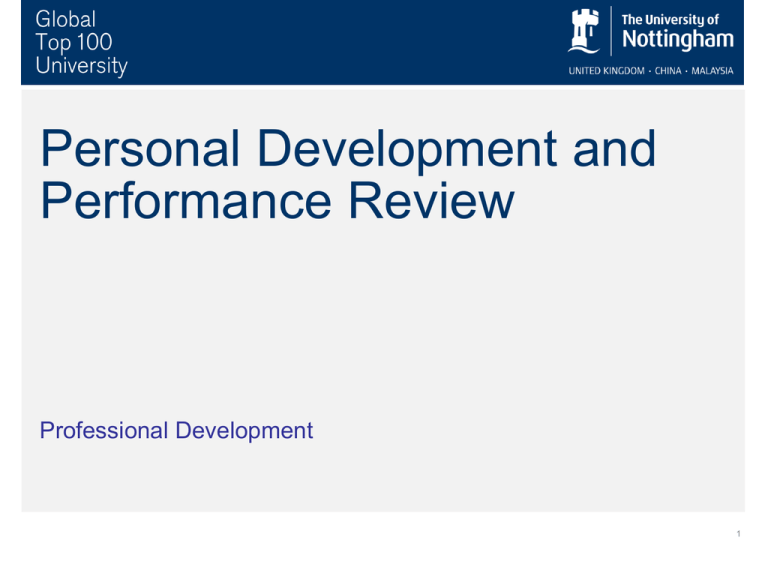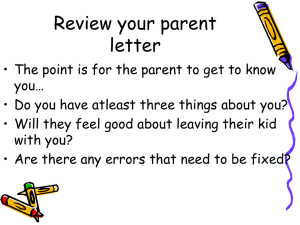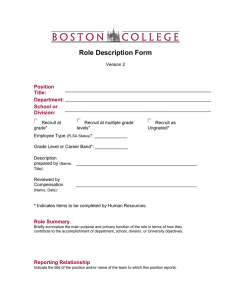Access the Microsoft PowerPoint slides
advertisement

Personal Development and Performance Review Professional Development 1 Advice and Guidance The HR Web site contains detailed guidance, including: • Downloadable PDPR Form • Managing exceptional circumstances • Goal setting • Constructive feedback • Behavioural competencies • Personal development planning http://www.nottingham.ac.uk/hr/guidesandsupport/perfor manceatwork/pdpr/index.aspx 2 Introduction What is the same? • Pay scales, exceptional performance bonuses • Timing • Basic principles, clear expectations, SMART output based goals. 3 Messages being reinforced • Renewed focus on development • Embedding PDPR, not a once a year meeting, but an ongoing process • The value of feedback (and some helpful guidance on HR website) • We will focus on the changes, which are….. 4 What’s New? • The Wording: Exceptional not exceeds expectations, three ratings not four • Timing, when we divulge the recommendation • Behavioural Competencies • The paperwork 5 Exceptional Performance Has performed to an exceptional level demonstrated by the fact that all or most objectives have been delivered to a standard over and above those expected for the role and level. In addition the individual may have taken on and delivered/contributed at a high standard to activities outside the normal scope of their role. Further development may be identified to maximise the full potential of the individual. 6 Performed to Requirements Has demonstrated through review of objectives, achievements and progress against development plans that they have performed to the requirements of the role and level during the reporting period. Further development may be identified to maximise the full potential of the individual and/or fine tune the skills and behaviours required and expected across the whole role. 7 Significantly Below Expectation Has performed significantly below the expectation of the role during the reporting period. Has not met or has not made sufficient progress towards their objectives and the standards agreed. Demonstrating clear areas of performance which require improvement and/or personal development. 8 9 Revealing the Recommendation • At the time of the meeting, or very soon afterwards, it is part of the form seen by the individual • It’s a recommendation, not a decision • Reviewers benefit from guidance about expectations of performance • A normative process, Schools and Departments will review all recommendations and may not accept all • The key is a transparent process. • Reviewers and individuals need feedback where the recommendation is not accepted. 10 Behavioural Competencies • Competencies are abilities or attributes, described in terms of behaviour, key to effective and/or highly effective performance within a particular job • They are applicable across a range of jobs, unlike specialist or technical skills which may be job specific. They provide a common language for describing performance and the abilities / attributes displayed by individuals. They focus on ‘how’ tasks are achieved, not ‘what’ is achieved. 11 Five Competency Groups Achieving and delivery Personal Effectiveness Working together Thinking and Innovation Managing, Leading and Developing others Behavioural Competencies Drive for results Serving the Customer Quality Focus Integrity Planning, Organising and Flexibility Confidence and Self Control Problem solving and Initiative Critical information seeking Communicating with Clarity Embracing Change Collaborating with Others Influencing and Relationship Building Innovation and Creativity Conceptual and strategic thinking Managing and Leading the Team 12 Behavioural Competencies - Uses • A basis for discussions about how a person does their job: – Where an individual is not delivering to expectation or to their own satisfaction – Where the individual wishes to develop their skills or career • Assess which competencies might be important for delivering a particular task or output, and assess the team and/or the individuals against that competency 13 Behavioural Competencies – Uses (2) • A way of informing goals where the role is based upon a service or process and where there are few measurable/observable outputs • We can frame standards of behaviour or service using the competency framework, for example, standards in: – Communication – Customer service – Leading and managing the team 14 Competencies – Some questions • Which ones are key for delivering the individual, team and organisational goals? • How well does the individual measure up to these competencies? • What evidence do we have to support this? • How can we develop any competency areas? • Are there skills areas not covered by these competencies? 15 The Paper Work! • What’s important is not the paper work, but the outcomes, objectives, performance and development that flow from the process • However it does look a bit different, the main difference relates to: – Recommendation is now shown to all role holders – Behavioral Competencies, space to record discussions and plans for improvement – Personal Development Plan 16 More Training! Managers/Reviewers • Feedback Skills for Managers • Coaching Skills for Managers Staff/Individuals • Personal Development Planning: Creating your own Personal Development Plan http://www.nottingham.ac.uk/csc 17 Summary • Not all changed, basic principles remain • Key changes: – – – – Wording of the recommendations Sharing the recommendation earlier in the process Behavioural competencies Paperwork Reminders about: – Development – Feedback – Not a “once a year event” 18 19


